Talent Manager Resume Examples

Jul 18, 2024
|
12 min read
Craft a talent manager resume that shines: Showcase your skills, experience, and passion for helping others succeed in their careers. Learn how to highlight your unique qualifications to stand out in a competitive field.
Rated by 348 people
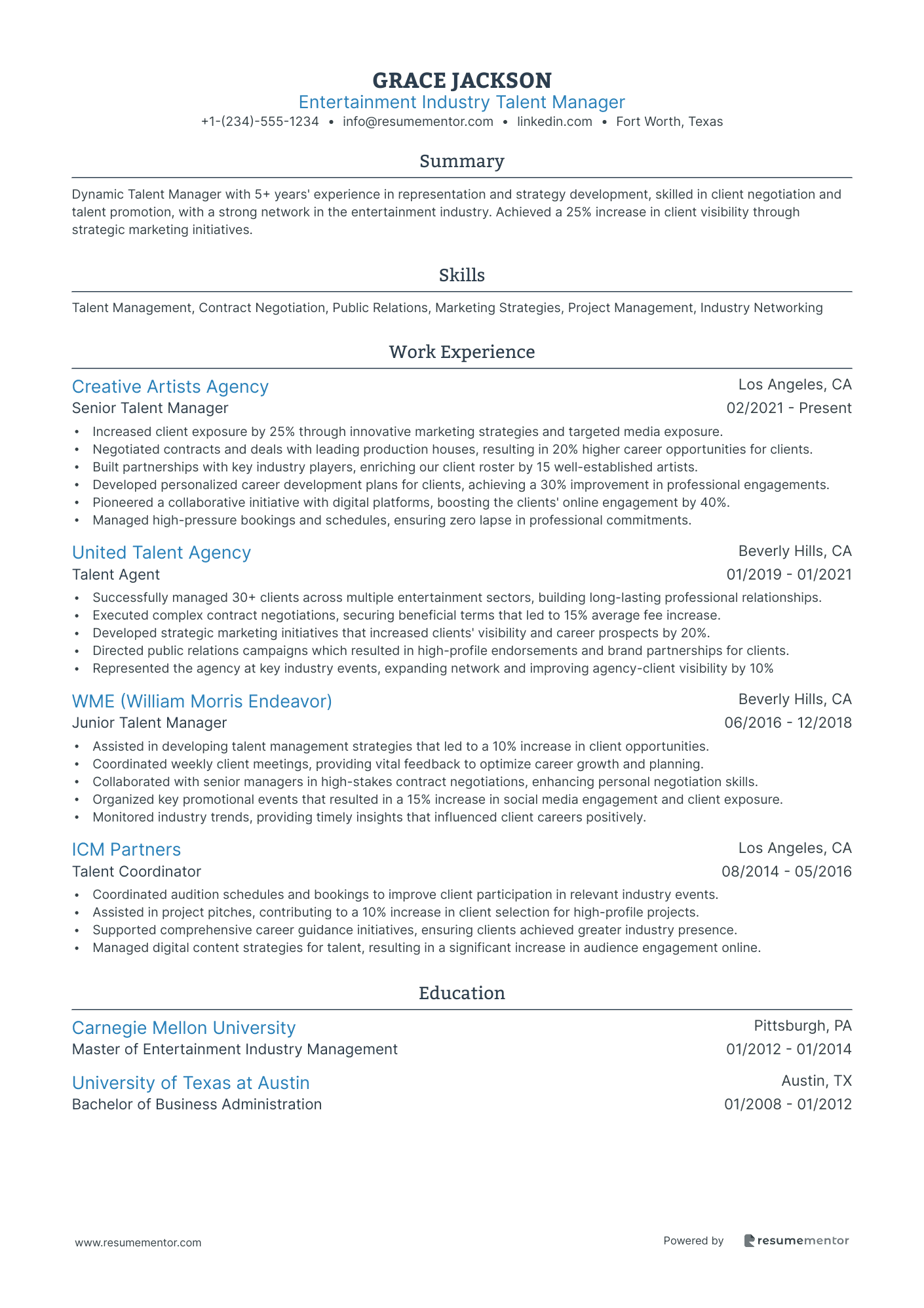
Entertainment Industry Talent Manager

Corporate Leadership Talent Manager
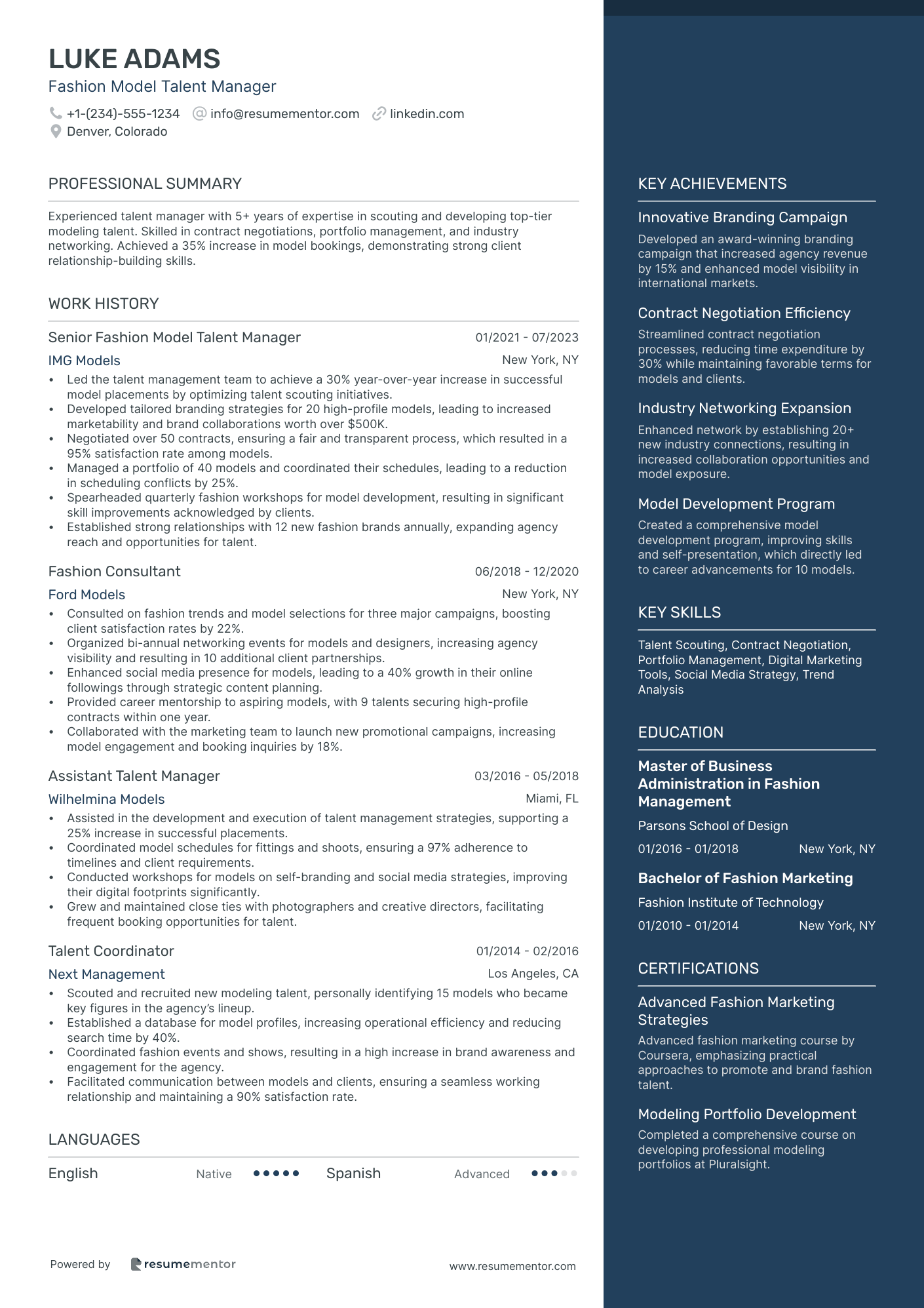
Fashion Model Talent Manager

Athlete Representation Talent Manager
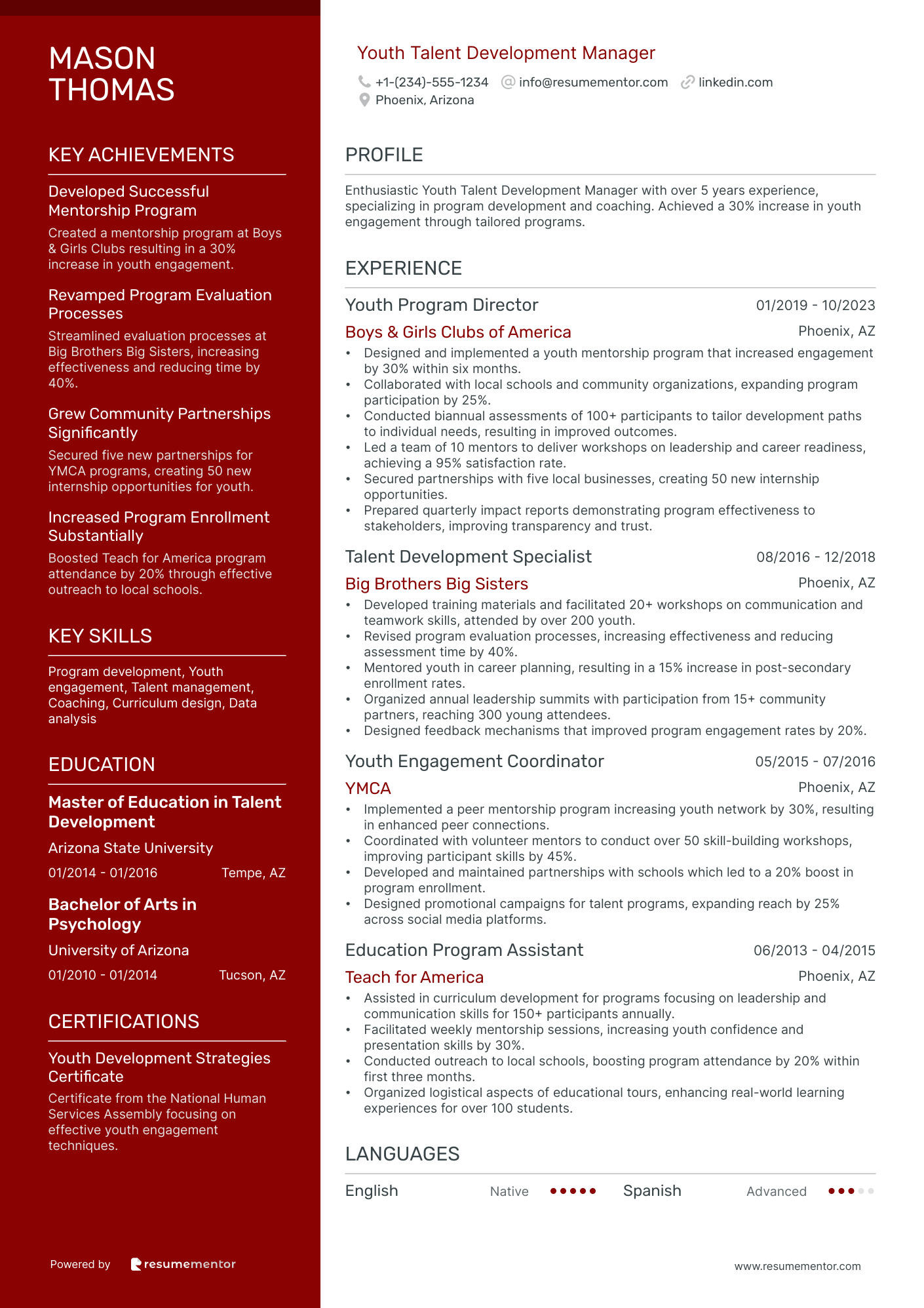
Youth Talent Development Manager
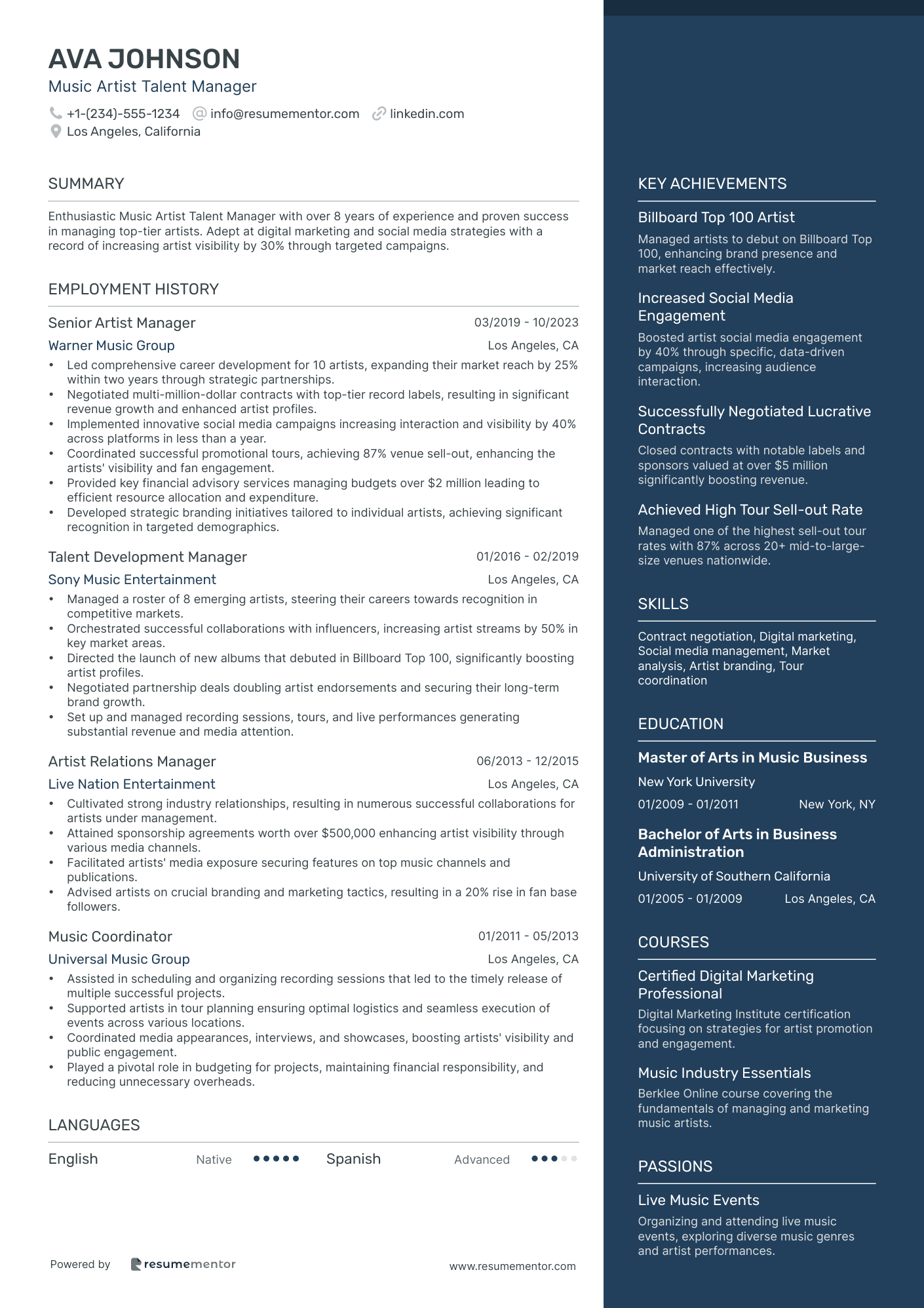
Music Artist Talent Manager
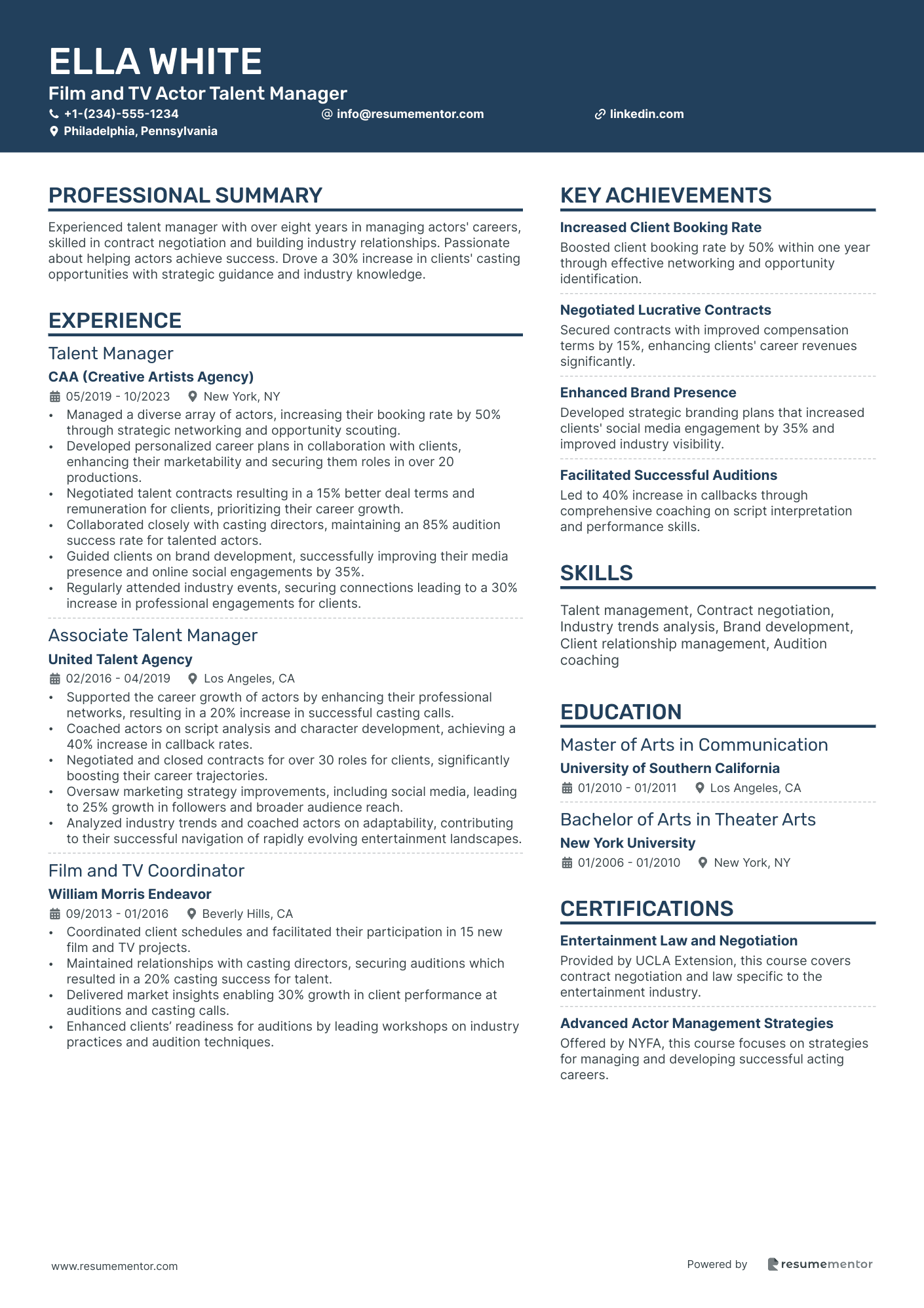
Film and TV Actor Talent Manager

Visual Artist Talent Manager
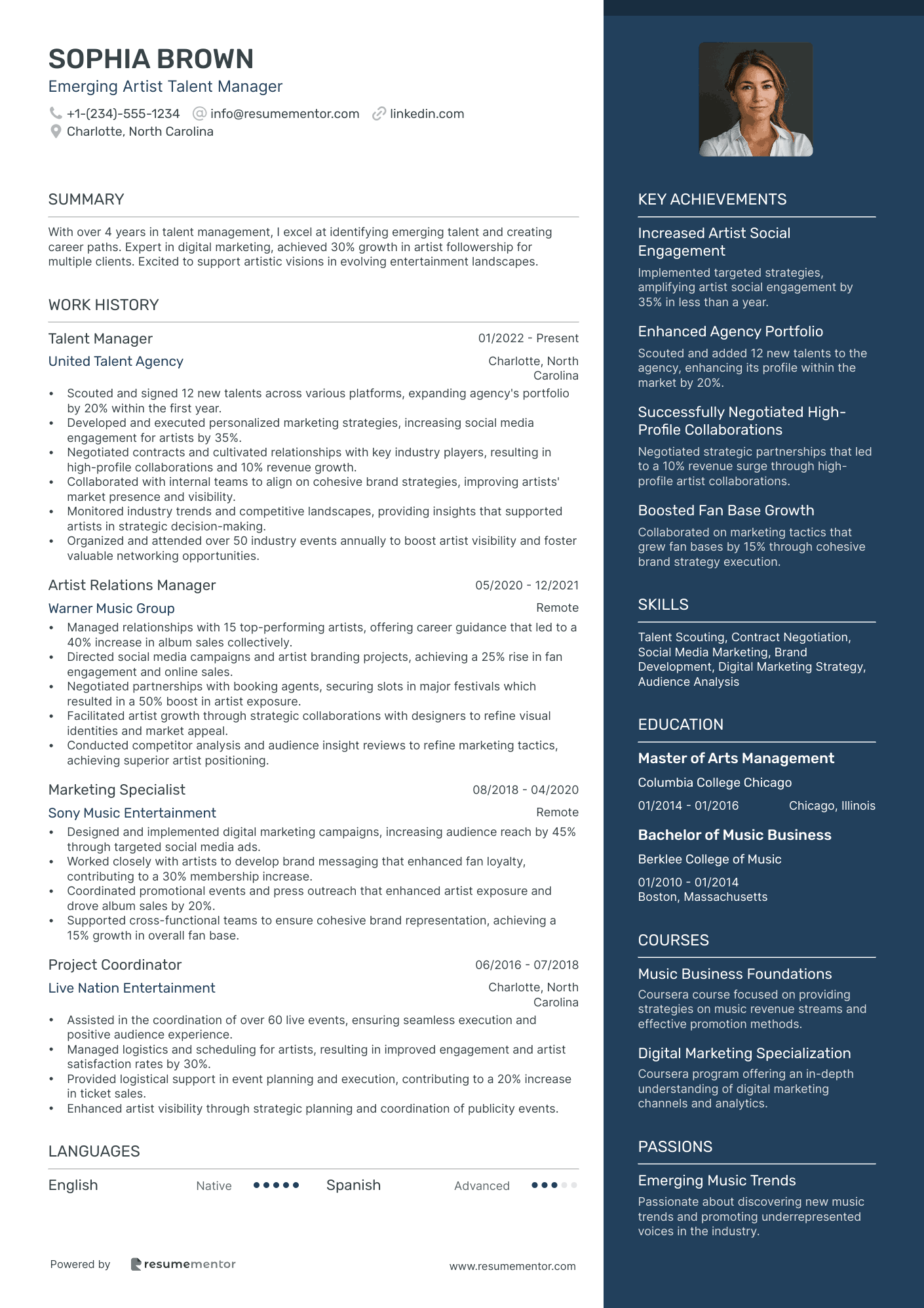
Emerging Artist Talent Manager
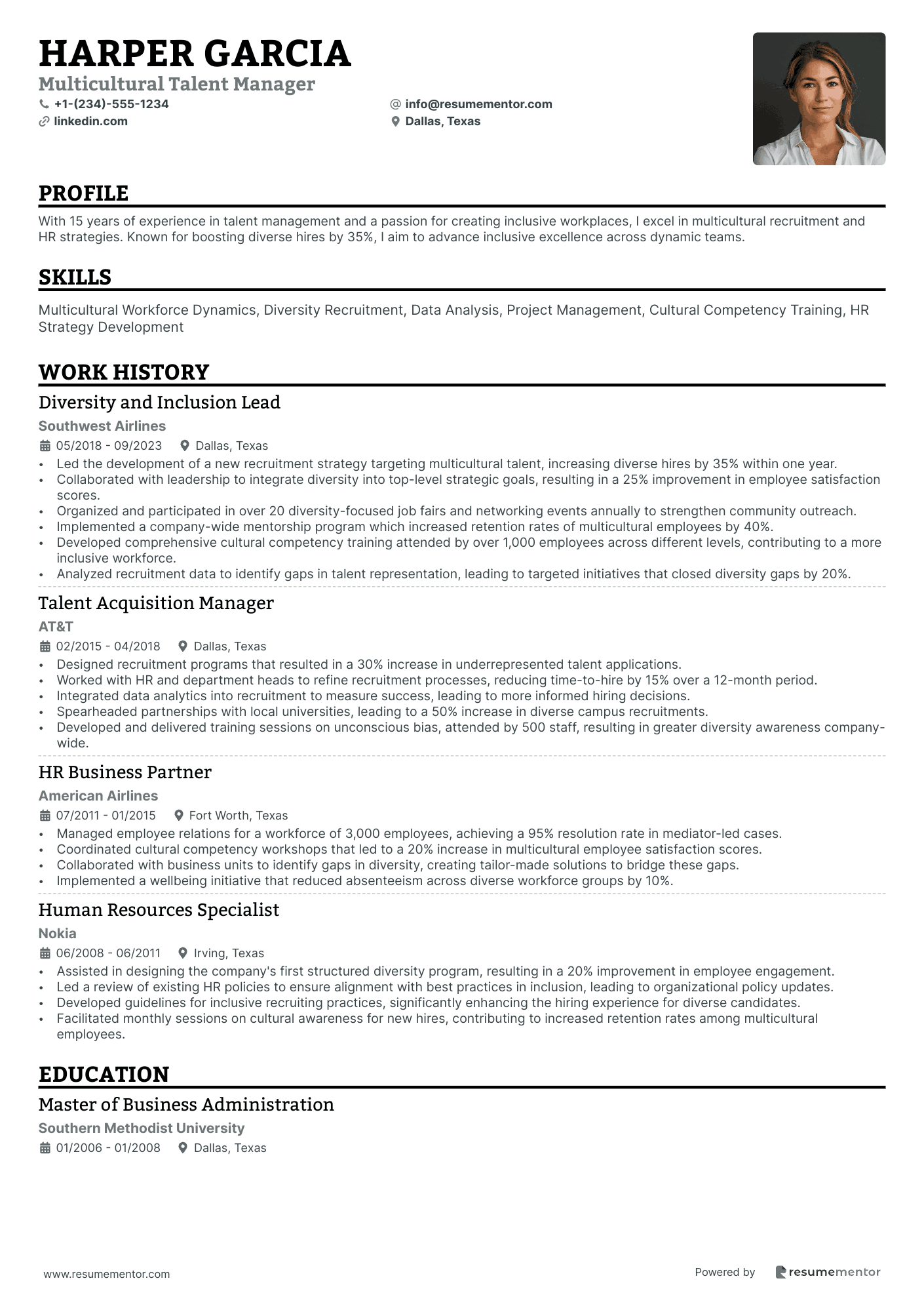
Multicultural Talent Manager

Entertainment Industry Talent Manager resume sample
- •Increased client exposure by 25% through innovative marketing strategies and targeted media exposure.
- •Negotiated contracts and deals with leading production houses, resulting in 20% higher career opportunities for clients.
- •Built partnerships with key industry players, enriching our client roster by 15 well-established artists.
- •Developed personalized career development plans for clients, achieving a 30% improvement in professional engagements.
- •Pioneered a collaborative initiative with digital platforms, boosting the clients' online engagement by 40%.
- •Managed high-pressure bookings and schedules, ensuring zero lapse in professional commitments.
- •Successfully managed 30+ clients across multiple entertainment sectors, building long-lasting professional relationships.
- •Executed complex contract negotiations, securing beneficial terms that led to 15% average fee increase.
- •Developed strategic marketing initiatives that increased clients' visibility and career prospects by 20%.
- •Directed public relations campaigns which resulted in high-profile endorsements and brand partnerships for clients.
- •Represented the agency at key industry events, expanding network and improving agency-client visibility by 10%
- •Assisted in developing talent management strategies that led to a 10% increase in client opportunities.
- •Coordinated weekly client meetings, providing vital feedback to optimize career growth and planning.
- •Collaborated with senior managers in high-stakes contract negotiations, enhancing personal negotiation skills.
- •Organized key promotional events that resulted in a 15% increase in social media engagement and client exposure.
- •Monitored industry trends, providing timely insights that influenced client careers positively.
- •Coordinated audition schedules and bookings to improve client participation in relevant industry events.
- •Assisted in project pitches, contributing to a 10% increase in client selection for high-profile projects.
- •Supported comprehensive career guidance initiatives, ensuring clients achieved greater industry presence.
- •Managed digital content strategies for talent, resulting in a significant increase in audience engagement online.
Corporate Leadership Talent Manager resume sample
- •Led the strategy and implementation for leadership potential programs, advancing 30% of participants to leadership roles within 18 months.
- •Created a multi-tier leadership development program, increasing internal leadership promotions by 40% over a three-year period.
- •Analyzed leadership feedback and program performance insights to enhance program effectiveness, boosting participant satisfaction rates by 20%.
- •Facilitated over 15 high-impact leadership workshops annually, receiving 95% positive feedback from attendees.
- •Partnered with HR to align leadership processes with talent strategy, leading to a 50% improvement in talent readiness.
- •Spearheaded collaboration with universities to establish partnership programs, enhancing our talent pipeline and apprenticeship opportunities.
- •Designed tailored development curriculum to address leadership skill gaps, resulting in a 25% competency improvement across leadership roles.
- •Managed the selection and development of leadership candidates, increasing retention rates among high-potential leaders by 15%.
- •Implemented leadership assessment tools, sharpening our leadership identification process and reducing turnover for leadership roles by 30%.
- •Led a cross-functional initiative to revamp executive training, enhancing engagement across modules and driving a 10% improvement in learning outcomes.
- •Developed and nurtured strong external partnerships, securing over $50,000 in support from industry leaders and educational partners annually.
- •Orchestrated a multinational leadership development initiative that impacted over 500 leaders globally, improving leadership competency metrics by 35%.
- •Introduced and facilitated new approaches in leadership evaluations, streamlining assessment time by 20% while improving accuracy.
- •Crafted leadership growth paths aligning with company objectives, fostering a 10% increase in succession planning efficiency.
- •Developed data-driven insights to enhance decision-making in talent management, increasing strategic agility in human resource management.
- •Enhanced talent alignment with business objectives, resulting in a consistent 30% improvement in organizational performance metrics.
- •Supported a comprehensive leadership skills matrix, contributing to identifying high-potential candidates for future leadership roles.
- •Executed assessment centers for leadership candidates, improving assessment accuracy by 15% compared to previous methodologies.
- •Facilitated leader-driven development workshops, contributing to a 20% increase in leadership preparedness assessments.
- •Collaborated on strategizing a new leadership philosophy, elevating team leader engagement scores by 35% over a year.
Fashion Model Talent Manager resume sample
- •Led the talent management team to achieve a 30% year-over-year increase in successful model placements by optimizing talent scouting initiatives.
- •Developed tailored branding strategies for 20 high-profile models, leading to increased marketability and brand collaborations worth over $500K.
- •Negotiated over 50 contracts, ensuring a fair and transparent process, which resulted in a 95% satisfaction rate among models.
- •Managed a portfolio of 40 models and coordinated their schedules, leading to a reduction in scheduling conflicts by 25%.
- •Spearheaded quarterly fashion workshops for model development, resulting in significant skill improvements acknowledged by clients.
- •Established strong relationships with 12 new fashion brands annually, expanding agency reach and opportunities for talent.
- •Consulted on fashion trends and model selections for three major campaigns, boosting client satisfaction rates by 22%.
- •Organized bi-annual networking events for models and designers, increasing agency visibility and resulting in 10 additional client partnerships.
- •Enhanced social media presence for models, leading to a 40% growth in their online followings through strategic content planning.
- •Provided career mentorship to aspiring models, with 9 talents securing high-profile contracts within one year.
- •Collaborated with the marketing team to launch new promotional campaigns, increasing model engagement and booking inquiries by 18%.
- •Assisted in the development and execution of talent management strategies, supporting a 25% increase in successful placements.
- •Coordinated model schedules for fittings and shoots, ensuring a 97% adherence to timelines and client requirements.
- •Conducted workshops for models on self-branding and social media strategies, improving their digital footprints significantly.
- •Grew and maintained close ties with photographers and creative directors, facilitating frequent booking opportunities for talent.
- •Scouted and recruited new modeling talent, personally identifying 15 models who became key figures in the agency’s lineup.
- •Established a database for model profiles, increasing operational efficiency and reducing search time by 40%.
- •Coordinated fashion events and shows, resulting in a high increase in brand awareness and engagement for the agency.
- •Facilitated communication between models and clients, ensuring a seamless working relationship and maintaining a 90% satisfaction rate.
Athlete Representation Talent Manager resume sample
- •Spearheaded the strategic management of 15 athletes, resulting in a 45% increase in overall sponsorship deals.
- •Negotiated contracts and endorsements worth over $2 million, significantly enhancing athlete earnings and brand exposure.
- •Developed innovative social media strategies that enhanced athlete brand visibility by 38% in one year.
- •Fostered and maintained robust relationships with major sports teams and sponsors, ensuring a diversified portfolio of opportunities.
- •Coordinated and executed over 20 high-profile public appearances and sponsorship events, elevating athlete profiles.
- •Advised on financial planning and marketing to align career trajectories with long-term goals.
- •Orchestrated athlete marketing campaigns that increased fan engagement by 55% across multiple platforms.
- •Played a key role in negotiating $1.5 million in athlete endorsements, showcasing strong negotiation capabilities.
- •Developed personalized career strategies to support athlete branding, resulting in a 25% growth in merchandise sales.
- •Monitored industry trends to identify growth opportunities, resulting in a 15% increase in client base.
- •Championed and executed successful digital marketing initiatives, improving social media reach by 40%.
- •Managed relationships with a diverse roster of athletes, enhancing satisfaction rates by 30% through personalized support.
- •Coordinated 10+ athlete appearances at industry events, significantly boosting visibility and fan interaction.
- •Conducted in-depth market analysis to tailor representation strategies, achieving a 20% uplift in athlete opportunities.
- •Facilitated workshops on financial literacy and career development, empowering athletes with critical skills.
- •Developed and implemented sports programs that increased athlete engagement by 35%, improving team cohesion.
- •Collaborated with cross-functional teams to execute successful sports marketing campaigns on a national scale.
- •Leveraged relationships with media partners, enhancing sports program visibility and reach by 20%.
- •Provided comprehensive support to athletes in career planning, ensuring alignment with targeted growth objectives.
Youth Talent Development Manager resume sample
- •Designed and implemented a youth mentorship program that increased engagement by 30% within six months.
- •Collaborated with local schools and community organizations, expanding program participation by 25%.
- •Conducted biannual assessments of 100+ participants to tailor development paths to individual needs, resulting in improved outcomes.
- •Led a team of 10 mentors to deliver workshops on leadership and career readiness, achieving a 95% satisfaction rate.
- •Secured partnerships with five local businesses, creating 50 new internship opportunities.
- •Prepared quarterly impact reports demonstrating program effectiveness to stakeholders, improving transparency and trust.
- •Developed training materials and facilitated 20+ workshops on communication and teamwork skills, attended by over 200 youth.
- •Revised program evaluation processes, increasing effectiveness and reducing assessment time by 40%.
- •Mentored youth in career planning, resulting in a 15% increase in post-secondary enrollment rates.
- •Organized annual leadership summits with participation from 15+ community partners, reaching 300 young attendees.
- •Designed feedback mechanisms that improved program engagement rates by 20%.
- •Implemented a peer mentorship program increasing youth network by 30%, resulting in enhanced peer connections.
- •Coordinated with volunteer mentors to conduct over 50 skill-building workshops, improving participant skills by 45%.
- •Developed and maintained partnerships with schools which led to a 20% boost in program enrollment.
- •Designed promotional campaigns for talent programs, expanding reach by 25% across social media platforms.
- •Assisted in curriculum development for programs focusing on leadership and communication skills for 150+ participants annually.
- •Facilitated weekly mentorship sessions, increasing youth confidence and presentation skills by 30%.
- •Conducted outreach to local schools, boosting program attendance by 20% within first three months.
- •Organized logistical aspects of educational tours, enhancing real-world learning experiences for over 100 students.
Music Artist Talent Manager resume sample
- •Led comprehensive career development for 10 artists, expanding their market reach by 25% within two years through strategic partnerships.
- •Negotiated multi-million-dollar contracts with top-tier record labels, resulting in significant revenue growth and enhanced artist profiles.
- •Implemented innovative social media campaigns increasing interaction and visibility by 40% across platforms in less than a year.
- •Coordinated successful promotional tours, achieving 87% venue sell-out, enhancing the artists' visibility and fan engagement.
- •Provided key financial advisory services managing budgets over $2 million leading to efficient resource allocation and expenditure.
- •Developed strategic branding initiatives tailored to individual artists, achieving significant recognition in targeted demographics.
- •Managed a roster of 8 emerging artists, steering their careers towards recognition in competitive markets.
- •Orchestrated successful collaborations with influencers, increasing artist streams by 50% in key market areas.
- •Directed the launch of new albums that debuted in Billboard Top 100, significantly boosting artist profiles.
- •Negotiated partnership deals doubling artist endorsements and securing their long-term brand growth.
- •Set up and managed recording sessions, tours, and live performances generating substantial revenue and media attention.
- •Cultivated strong industry relationships, resulting in numerous successful collaborations for artists under management.
- •Attained sponsorship agreements worth over $500,000 enhancing artist visibility through various media channels.
- •Facilitated artists' media exposure securing features on top music channels and publications.
- •Advised artists on crucial branding and marketing tactics, resulting in a 20% rise in fan base followers.
- •Assisted in scheduling and organizing recording sessions that led to the timely release of multiple successful projects.
- •Supported artists in tour planning ensuring optimal logistics and seamless execution of events across various locations.
- •Coordinated media appearances, interviews, and showcases, boosting artists' visibility and public engagement.
- •Played a pivotal role in budgeting for projects, maintaining financial responsibility, and reducing unnecessary overheads.
Film and TV Actor Talent Manager resume sample
- •Managed a diverse array of actors, increasing their booking rate by 50% through strategic networking and opportunity scouting.
- •Developed personalized career plans in collaboration with clients, enhancing their marketability and securing them roles in over 20 productions.
- •Negotiated talent contracts resulting in a 15% better deal terms and remuneration for clients, prioritizing their career growth.
- •Collaborated closely with casting directors, maintaining an 85% audition success rate for talented actors.
- •Guided clients on brand development, successfully improving their media presence and online social engagements by 35%.
- •Regularly attended industry events, securing connections leading to a 30% increase in professional engagements for clients.
- •Supported the career growth of actors by enhancing their professional networks, resulting in a 20% increase in successful casting calls.
- •Coached actors on script analysis and character development, achieving a 40% increase in callback rates.
- •Negotiated and closed contracts for over 30 roles for clients, significantly boosting their career trajectories.
- •Oversaw marketing strategy improvements, including social media, leading to 25% growth in followers and broader audience reach.
- •Analyzed industry trends and coached actors on adaptability, contributing to their successful navigation of rapidly evolving entertainment landscapes.
- •Coordinated client schedules and facilitated their participation in 15 new film and TV projects.
- •Maintained relationships with casting directors, securing auditions which resulted in a 20% casting success for talent.
- •Delivered market insights enabling 30% growth in client performance at auditions and casting calls.
- •Enhanced clients’ readiness for auditions by leading workshops on industry practices and audition techniques.
- •Served as a key contact between casting directors and actors, ensuring successful communication and collaboration in all phases.
- •Organized casting events that boosted actor exposure and participation in high-profile projects by 25%.
- •Leveraged industry contacts to aid actors in securing auditions, resulting in increased casting opportunities.
- •Provided strategic insights for talent development leading to multiple successful client placements in TV series.
Visual Artist Talent Manager resume sample
- •Recruited and managed over 40 artists, increasing engagement by 30% and resulting in a 20% rise in project acquisition.
- •Spearheaded negotiations securing $150K+ in contracts for digital artists with various industries in the past year.
- •Developed personalized branding strategies leading to a 25% increase in artist visibility across social media platforms.
- •Initiated monthly artist networking events resulting in three long-term projects with industry-leading art galleries.
- •Enhanced artist portfolios leading to a 40% increase in inquiries from potential clients and industry partners.
- •Monitored industry trends, positioning the talent pool to capture new opportunities and gain competitive edge.
- •Managed a portfolio of 30 visual artists, leading to a 50% contract renewal rate with high-profile clients.
- •Collaborated with artists to optimize marketing strategies, increasing their market rate by 15% over two years.
- •Facilitated workshops for skill enhancement, contributing to a 35% growth in successful client pitches.
- •Secured partnerships with three new art galleries, slightly boosting the agency's commission income by 10%.
- •Created comprehensive performance reports identifying improvement areas that enhanced artist-client relationships.
- •Assisted in managing relationships with over 20 artists, resulting in a collection increase by 30% for gallery attendees.
- •Promoted artist exhibitions through curated social media campaigns, growing event attendance by 40%.
- •Coordinated between artists and gallery, ensuring seamless delivery and setup of 25+ exhibitions annually.
- •Provided analytical insights on prevailing market trends, helping artists tailor their work to contemporary tastes.
- •Counseled emerging artists on portfolio development which resulted in a 50% increase in gallery exhibitions.
- •Negotiated pricing and contracts for artist works, fostering client relationships and increasing sales by 20%.
- •Executed outreach programs that elevated artists' profiles, leading to eight successful collaborations.
- •Assessed artistic formats to guide artists in meeting emerging trends and expanding their potential audience.
Emerging Artist Talent Manager resume sample
- •Scouted and signed 12 new talents across various platforms, expanding agency's portfolio by 20% within the first year.
- •Developed and executed personalized marketing strategies, increasing social media engagement for artists by 35%.
- •Negotiated contracts and cultivated relationships with key industry players, resulting in high-profile collaborations and 10% revenue growth.
- •Collaborated with internal teams to align on cohesive brand strategies, improving artists' market presence and visibility.
- •Monitored industry trends and competitive landscapes, providing insights that supported artists in strategic decision-making.
- •Organized and attended over 50 industry events annually to boost artist visibility and foster valuable networking opportunities.
- •Managed relationships with 15 top-performing artists, offering career guidance that led to a 40% increase in album sales collectively.
- •Directed social media campaigns and artist branding projects, achieving a 25% rise in fan engagement and online sales.
- •Negotiated partnerships with booking agents, securing slots in major festivals which resulted in a 50% boost in artist exposure.
- •Facilitated artist growth through strategic collaborations with designers to refine visual identities and market appeal.
- •Conducted competitor analysis and audience insight reviews to refine marketing tactics, achieving superior artist positioning.
- •Designed and implemented digital marketing campaigns, increasing audience reach by 45% through targeted social media ads.
- •Worked closely with artists to develop brand messaging that enhanced fan loyalty, contributing to a 30% membership increase.
- •Coordinated promotional events and press outreach that enhanced artist exposure and drove album sales by 20%.
- •Supported cross-functional teams to ensure cohesive brand representation, achieving a 15% growth in overall fan base.
- •Assisted in the coordination of over 60 live events, ensuring seamless execution and positive audience experience.
- •Managed logistics and scheduling for artists, resulting in improved engagement and artist satisfaction rates by 30%.
- •Provided logistical support in event planning and execution, contributing to a 20% increase in ticket sales.
- •Enhanced artist visibility through strategic planning and coordination of publicity events.
Multicultural Talent Manager resume sample
- •Led the development of a new recruitment strategy targeting multicultural talent, increasing diverse hires by 35% within one year.
- •Collaborated with leadership to integrate diversity into top-level strategic goals, resulting in a 25% improvement in employee satisfaction scores.
- •Organized and participated in over 20 diversity-focused job fairs and networking events annually to strengthen community outreach.
- •Implemented a company-wide mentorship program which increased retention rates of multicultural employees by 40%.
- •Developed comprehensive cultural competency training attended by over 1,000 employees across different levels, contributing to a more inclusive workforce.
- •Analyzed recruitment data to identify gaps in talent representation, leading to targeted initiatives that closed diversity gaps by 20%.
- •Designed recruitment programs that resulted in a 30% increase in underrepresented talent applications.
- •Worked with HR and department heads to refine recruitment processes, reducing time-to-hire by 15% over a 12-month period.
- •Integrated data analytics into recruitment to measure success, leading to more informed hiring decisions.
- •Spearheaded partnerships with local universities, leading to a 50% increase in diverse campus recruitments.
- •Developed and delivered training sessions on unconscious bias, attended by 500 staff, resulting in greater diversity awareness company-wide.
- •Managed employee relations for a workforce of 3,000 employees, achieving a 95% resolution rate in mediator-led cases.
- •Coordinated cultural competency workshops that led to a 20% increase in multicultural employee satisfaction scores.
- •Collaborated with business units to identify gaps in diversity, creating tailor-made solutions to bridge these gaps.
- •Implemented a wellbeing initiative that reduced absenteeism across diverse workforce groups by 10%.
- •Assisted in designing the company's first structured diversity program, resulting in a 20% improvement in employee engagement.
- •Led a review of existing HR policies to ensure alignment with best practices in inclusion, leading to organizational policy updates.
- •Developed guidelines for inclusive recruiting practices, significantly enhancing the hiring experience for diverse candidates.
- •Facilitated monthly sessions on cultural awareness for new hires, contributing to increased retention rates among multicultural employees.
Navigating the world of talent management is much like conducting an orchestra, where every detail matters to create harmony. However, writing your resume can sometimes feel overwhelming because it requires you to reflect your unique blend of skills, from negotiating contracts to spotlighting emerging stars. To make your resume grab attention like the talents you manage, it's crucial to present your experiences effectively.
One of the toughest parts can be choosing which accomplishments to showcase, striking the right balance between your strategic vision and tangible results. Condensing your vast experience in the entertainment industry into one compelling page is no small feat. Yet, you need to engage potential employers with a clear depiction of your expertise.
Using a resume template can streamline this process by offering necessary structure and focus, making your competencies shine without the added stress. This approach saves you time while ensuring a polished and professional presentation of your achievements. You might find that checking out resume templates designed to suit your needs provides a helpful starting point.
Crafting a strong resume as a talent manager requires precision and creativity, allowing your skills to take center stage. With the right tools and insights, your resume can become a powerful platform, reflecting your ability to guide others to the spotlight while moving your career forward.
Key Takeaways
- Writing a talent manager resume requires highlighting strengths in talent acquisition, employee development, and building industry relationships to stand out in a competitive field.
- Using a resume template can help streamline the process by providing structure and focus, saving time and ensuring a polished presentation of achievements.
- The resume should have a clear organization highlighting contact information, professional summary, work experience, skills, education, and achievements.
- Opt for a clean, modern format with appropriate fonts like Lato, Montserrat, or Raleway, and save the resume as a PDF to maintain consistent formatting across devices.
- Include quantifiable metrics in the work experience section to provide concrete evidence of your impact, using action verbs to convey leadership abilities.
What to focus on when writing your talent manager resume
A talent manager resume should clearly convey your expertise in managing and developing talent by highlighting your strengths in identifying, nurturing, and retaining top performers. This resume should showcase your skills in talent acquisition, employee development, and building strong relationships within the entertainment or corporate sectors—communicating this effectively helps set you apart in a competitive field.
How to structure your talent manager resume
- Contact Information: Begin with your full name, phone number, and professional email address to ensure recruiters can reach you easily. Be sure to use a professional email and avoid nicknames, as first impressions matter even on paper—establishing credibility from the start.
- Professional Summary: Give a brief overview of your talent management experience that sets the tone for the rest of the resume. Include key skills like talent acquisition, employee development, and building industry relationships to immediately capture interest. This section should act as a snapshot of your professional identity—offering a potent introduction to who you are and what you bring to the table.
- Work Experience: Detail your previous roles in reverse chronological order. This section should expand on the professional summary, focusing on specific achievements and results that exemplify your impact in talent management. Use quantifiable metrics where possible to illustrate the effectiveness of your strategies—demonstrating tangible outcomes provides evidence of your capabilities.
- Skills: Complement your work experience by listing essential skills such as talent assessment, contract negotiation, and performance management. Tailor this section to emphasize competencies that are directly relevant to the role you're targeting. Here, consistency with the rest of your resume is key—ensuring a cohesive story that aligns with the duties and expectations outlined in the job description.
- Education: Include your degrees and relevant certifications to support the skills and experience you've highlighted. Mention specific courses or training that enhance your talent management expertise to show your commitment to professional growth—demonstrating a proactive approach to learning and adaptability in a fast-evolving industry.
- Achievements: Round out the resume with any awards or recognitions you’ve received, underscoring your measurable impacts, like improved talent retention rates. Highlight how these achievements align with your career goals and the value you can bring to future roles—a powerful way to reinforce your candidacy.
Transitioning smoothly from "how-to" into the practical side of crafting your resume, the next step involves discussing the ideal format to structure and highlight each section more in-depth.
Which resume format to choose
Crafting a resume as a talent manager involves skillfully combining several elements to effectively highlight your expertise. Begin with a clean, modern format that mirrors the professionalism required in the talent industry. The visual tone is crucial, so selecting the right font is important. Opt for fonts like Lato, Montserrat, or Raleway, which provide a modern touch and help your resume stand out without overwhelming the reader. These fonts maintain a fresh but professional feel, important for a role that balances creativity with business acumen.
Ensuring your resume is easily accessible and retains its intended format is vital. Always save and distribute your resume as a PDF. PDFs protect your formatting, ensuring your resume looks the same on any device, which is essential in professional settings where presentation matters.
Margins matter more than you might think, offering breathing room on the page to enhance readability. Set them at around one inch on all sides to provide ample space for each section to stand out without feeling cramped. This careful attention to detail transforms your resume into a polished and engaging document, designed to capture the interest of hiring managers familiar with the demands and nuances of the talent management field.
How to write a quantifiable resume experience section
A standout talent manager resume experience section skillfully aligns your achievements with the needs of the position you're pursuing. Begin by organizing your experiences in reverse chronological order to showcase your most recent and relevant roles. Focus on positions where you’ve made measurable impacts, ensuring your resume resonates with the job ad's requirements. Use action verbs like "orchestrated," "nurtured," and "optimized" to convey your leadership, while highlighting tasks directly linked to talent acquisition, management, and retention.
Seamlessly integrate your experience section into your resume by proving that your skills and qualifications align with the job description. Tailor each bullet point to emphasize your contributions and the results you achieved, so each entry underlines your talent management strengths.
- •Boosted talent pipeline by 40% through strategic partnerships with industry networks.
- •Cut time-to-hire by 30% by introducing a streamlined recruitment process.
- •Improved employee retention by 25% with targeted training programs.
- •Led a team of 15 recruiters, enhancing hiring efficiency by 50%.
This experience section effectively connects your past roles to the needs of potential employers, clearly demonstrating how you've efficiently managed talent. The measurable achievements provided offer concrete evidence of your impact, while the clear structure allows for easy scanning by hiring managers. The emphasis on actionable results makes your ability to drive growth and efficiency apparent, thereby making your resume more competitive. This cohesive narrative, where action verbs and metrics highlight your professional story, not only sparks interest but also positions you as a valuable asset to any team.
Customer-Focused resume experience section
A customer-focused talent manager resume experience section should demonstrate how you’ve excelled in managing and nurturing client relationships, leading to increased happiness and loyalty. Your resume needs to showcase specific achievements and the positive impacts you’ve had on client retention and satisfaction. Start by reflecting on key moments in your career where you excelled in roles centered on customer interaction. Think about times when you demonstrated empathy, solved client issues, or anticipated their needs effectively. Avoid industry jargon and instead, share stories and outcomes that clearly highlight your capabilities.
Organize these experiences using bullet points for clear and concise communication. Each bullet should seamlessly convey what you accomplished, how you achieved it, and the results that followed. Numbers can make your achievements more compelling, so include figures where possible to quantify your success. Strive to balance detailing general responsibilities with highlighting unique contributions, allowing potential employers to grasp both the scope of your roles and your specific impact.
Talent Manager
Horizons Inc.
2018 - 2022
- Managed a portfolio of high-profile clients, improving satisfaction scores by 20% over two years
- Developed personalized engagement strategies, resulting in a 30% increase in client retention
- Collaborated with clients to identify talent needs, successfully placing 50+ candidates annually
- Organized quarterly feedback sessions to gather insights, driving ongoing improvements in service delivery
Innovation-Focused resume experience section
An innovation-focused talent manager resume experience section should emphasize your ability to drive positive change and introduce creative solutions. Begin by selecting a job title and workplace that best reflect your leadership and forward-thinking skills. Then, briefly highlight your key achievements, such as implementing new recruitment technologies or revamping existing processes, to showcase your innovative approach. When crafting your bullet points, focus on specific instances where your fresh ideas led to improved team performance, better employee experiences, or streamlined operations.
Using strong action verbs in your bullet points helps convey your accomplishments clearly and emphatically. Emphasize the positive outcomes your innovations brought to the organization, and, whenever possible, quantify these results to make a stronger impact. Highlight unique programs you initiated, strategies you led, or contributions that set your work apart from traditional practices. Keep the language simple and direct to ensure your achievements in innovation are easily understood and appreciated, without relying on complex jargon.
Talent Manager
XYZ Corporation
January 2020 - Present
- Spearheaded the implementation of a digital recruitment platform, reducing hiring time by 30%.
- Developed a mentorship program that boosted employee retention by 15% within the first year.
- Introduced a new talent assessment tool that improved job matching accuracy by 20%.
- Led a cross-functional team to create an inclusive onboarding process, enhancing new hire engagement.
Project-Focused resume experience section
A project-focused talent manager resume experience section should clearly illustrate your ability to effectively manage and develop talent within projects. Begin by listing your most recent or relevant experience, highlighting specific projects where you've demonstrated your skills. Describe the project's scope and your role, showing how your contributions made a significant impact. Action words and quantifiable outcomes are key to demonstrating the value you added.
Then, develop bullet points that connect your achievements across different facets of the role, such as talent acquisition, project management, and teamwork. Each bullet should build on the last, reflecting how your efforts collectively led to positive outcomes for the company. This approach not only showcases your skills but also weaves a coherent and compelling narrative of your professional journey.
Senior Talent Manager
Innovate Solutions Corp.
January 2020 - June 2023
- Led a team of 15 in overhauling talent strategies for key projects, which boosted efficiency by 25% and paved the way for further improvements.
- Collaborated with different teams to identify skill gaps, launching targeted training programs that improved performance by 30% across the board.
- Fostered strong relationships with external partners, broadening the talent pool and significantly reducing hiring time by 40%, which supported faster project start times.
- Applied data-driven insights to monitor project progress, which not only optimized workflows but also resulted in a 90% satisfaction rate from stakeholders.
Training and Development Focused resume experience section
A training and development-focused talent manager resume experience section should smoothly highlight your achievements and contributions in past roles. Begin by listing your job titles and the dates you held each position to set the context for your experiences. Follow this with bullet points that capture your responsibilities and successes, focusing on measurable outcomes such as enhanced team growth or effective training initiatives. By using strong action verbs, you can demonstrate your impact and how your skills relate to talent management.
Link your experiences around themes like leadership, skill development, and communication to emphasize your capability in fostering a learning environment. Share any successful programs or initiatives you've led, highlighting how they improved team performance or employee satisfaction. This approach allows you to spotlight specific results, showcasing your competence and the potential value you can bring to future roles.
Talent Manager
Bright Future Tech
January 2019 - August 2022
- Developed and implemented a mentorship program that increased employee retention by 15%.
- Led a team of 10 to deliver interactive workshops, resulting in a 25% increase in skills proficiency.
- Created personalized training plans for 50 employees, boosting productivity by an average of 20%.
- Collaborated with department heads to align training programs with company goals, enhancing team performance.
Write your talent manager resume summary section
A talent-focused resume summary should capture your strongest skills, experiences, and accomplishments in a concise way. For a talent manager role, it's essential to highlight your leadership in recruiting and team development. Using lively language can quickly grab attention. Consider including specific achievements, as they can make your summary stand out. Here's how you might write it:
Your choice of words should reflect your unique skills, with terms like "dynamic" and "results-driven" painting a compelling picture of your professional image. Quantifying achievements with metrics can further enhance your credibility. It’s important to understand the distinctions between different resume components to convey the right message. A summary provides a snapshot of your career, best for those with a substantial professional background. For those just starting, a resume objective outlines your career goals instead of past accomplishments. Meanwhile, a resume profile combines career highlights with personal traits, and a summary of qualifications presents a bulleted list of relevant skills. Tailoring these sections for your career stage and the specific position shows adaptability and focus. A well-thought-out resume summary can significantly boost your chances of landing an interview, presenting you as the perfect candidate for the role you're eyeing.
Listing your talent manager skills on your resume
A skills-focused talent manager resume should clearly showcase the abilities that make you stand out. You can feature these skills in a dedicated section or seamlessly integrate them into your experience and summary. Highlighting your strengths and soft skills is crucial because they demonstrate your capacity to work well with others and adapt to dynamic situations. In contrast, hard skills are specific abilities such as software proficiency and project management. Both types of skills act as keywords, making your resume more visible and appealing to recruiters.
Here's a template for creating an effective standalone skills section:
This layout is impactful because it clearly communicates abilities essential to a talent manager's role. Individual skills are direct and concise, ensuring your expertise is noticeable to potential employers, providing a clear picture of your value.
Best hard skills to feature on your talent manager resume
In the realm of technical expertise, hard skills highlight your ability to oversee projects and optimize resources. As a talent manager, these skills should communicate your leadership and management capabilities. Key hard skills to consider include:
Hard Skills
- Project management
- Talent acquisition
- Succession planning
- HRIS proficiency
- Data analysis
- Budgeting and financial planning
- Contract negotiation
- Performance metrics evaluation
- Workforce planning
- Risk management
- Training and development
- Employment law knowledge
- Trend analysis
- Resource allocation
- Recruitment marketing
Best soft skills to feature on your talent manager resume
Soft skills enhance your resume by showcasing how you interact and collaborate with others. These skills reflect your compatibility with a team and ability to resonate with company culture. Essential soft skills include:
Soft Skills
- Communication
- Leadership
- Problem-solving
- Empathy
- Negotiation
- Emotional intelligence
- Adaptability
- Coaching and mentoring
- Relationship building
- Conflict resolution
- Time management
- Creativity
- Decision-making
- Team collaboration
- Reliability
How to include your education on your resume
An education section is an essential part of your talent manager resume. It highlights your academic achievements and qualifications. Tailor it to fit the job you're applying for, excluding any irrelevant education. Including your GPA is optional, but if it is impressive, add it to show academic excellence. Place it next to your degree, like: "Bachelor of Arts in Business Administration, GPA: 3.8/4.0." For honors like cum laude, list it after the degree, such as "Bachelor of Arts, cum laude." Use a clear format to list your degree, specifying the degree name, institution, and the years attended.
Here’s an example of a poorly crafted education section.
- •Studied various photography techniques.
Now, look at a better example for a talent manager role.
This example is effective because it focuses on relevant education for a talent manager. It highlights academic excellence while maintaining clarity and conciseness. It gives prospective employers information to gauge your academic background tailored specifically for the job.
How to include talent manager certificates on your resume
Adding a certificates section to your talent manager resume is essential. Certifications demonstrate your qualifications and commitment to ongoing professional development. List the name of the certificate first, followed by the issuing organization, to show its credibility. Include the date of issuance to inform the employer of the timeframe of your qualification. Add the issuing organization to verify authenticity. You can also include certificates in the header for immediate visibility.
Here’s an example formatted in JSON:
These certifications directly relate to talent management, showcasing your expertise in identifying and nurturing talent. Employers will appreciate the relevance, especially if they recognize the credibility of the certifying bodies. This example is good because it clearly lists the certifications in an organized manner, making it easy for hiring managers to verify your credentials. Using simple and clear language ensures the section is accessible and understandable. Including this section prominently can significantly bolster your resume.
Extra sections to include in your talent manager resume
In today's competitive job market, an impressive talent manager resume needs more than just experience and skills. It should reflect your unique strengths, versatility, and commitment to enhancing talent.
- Language section—Highlight your proficiency in multiple languages to show your ability to work with diverse clients and teams.
- Hobbies and interests section—Share your hobbies and interests to give potential employers a glimpse of your personality and well-rounded character.
- Volunteer work section—Showcase your dedication to giving back to the community, which demonstrates your leadership and compassion.
- Books section—Mention books that have influenced your professional development to illustrate your commitment to continuous learning.
In Conclusion
In conclusion, crafting a compelling resume as a talent manager involves a thoughtful blend of showcasing your abilities and demonstrating your impact. A strong resume acts as a platform for sharing your story, highlighting your success in nurturing and developing talent. It's important to reflect on your unique skills and experiences, ensuring they align with the requirements of the role you seek. Clearly articulated achievements, combined with relevant certifications, underscore your professional capabilities and commitment to excellence in talent management. Furthermore, choosing the right resume format and including sections that highlight both hard and soft skills can make a significant difference in catching the eye of potential employers. By presenting your educational background effectively and any relevant certificates, you add weight to your credentials. Integrating additional sections like language proficiency or volunteer work can enhance your resume, showcasing the diversity of your experiences. The goal is to present yourself as a well-rounded candidate who can effectively contribute to and lead a team. Ultimately, your resume should resonate with your professional journey, positioning you as a valuable asset ready to navigate the complexities of talent management.
Related Articles

Continue Reading
Check more recommended readings to get the job of your dreams.
Resume
Resources
Tools
© 2026. All rights reserved.
Made with love by people who care.

